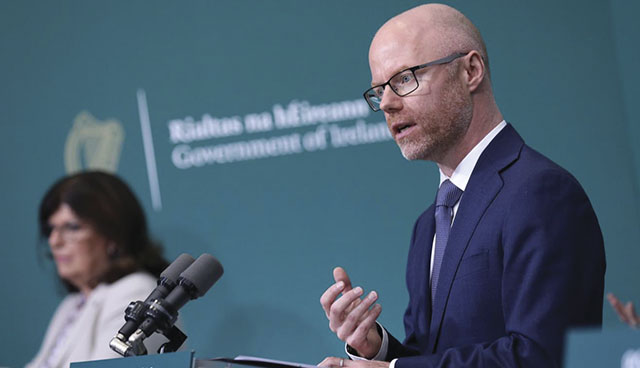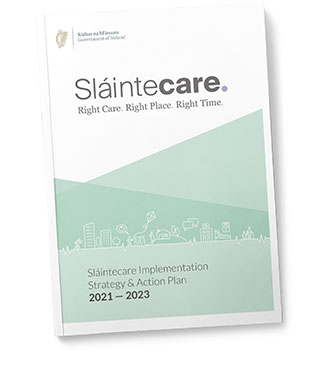Sláintecare Implementation Plan 2021–2023

Budget 2022 detailed the spending of €1.5 billion in additional government funding to “progress critical strategic reform measures at pace across the health system”. These reforms are “underpinned by the principles set out in the Sláintecare Implementation Strategy and Action Plan 2021–2023”.
Along with the €1.5 billion outlined within the Budget that would progress the aims of Sláintecare as illustrated in the implementation strategy and action plan, the record €21 billion investment in health and social services delivered by Budget 2022 also includes €45 million specifically to “advance the Sláintecare objective that care is accessible and affordable for the most vulnerable”.
Speaking upon the publication of the Budget, Minister for Health Stephen Donnelly TD said that the funding delivered would “address health inequalities and substantially ramp up the resources allocated” in a fashion “embodying the Sláintecare principles of delivering the right care, in the right place at the right time”.
Under the “three key dimensions” of Sláintecare (access, quality, and affordability), the Budget delivered various commitments. Under access, €10.5 million will be provided for an additional 19 critical care beds in 2022, bringing the total to 340; €8 million will be provided to increase the capacity of the National Ambulance Service; and €22 million be provided for additional Winter Plan measures in 2022.
In terms of quality measures, €36.5 million is to be provided for “a range of measures” including progression of the Safe Staffing Framework, which seeks to reduce patient time in emergency care settings and “better outcomes for patients and staff”, and expansion of the advanced nursing and midwifery workforce. Lastly, the €45 million pledged to affordability measures will enable the expansion of access to free GP care to children aged seven, the reduction of the monthly threshold for the Drug Payment Scheme from €114 to €100 and “moving on a phased basis to reduce the financial burden of hospital charges for children under 18”.
The Sláintecare Implementation Strategy and Action Plan 2021–2023 outlines the eight fundamental principles of Sláintecare: patient is paramount; timely access; prevention and public health; free at the point of delivery; workforce; public money and interest; engagement; and accountability. To begin on the path to delivering on these principles, the document sets out the two reform programmes to be prioritised from 2021 to 2023: improving safe, timely access to care and promoting health and wellbeing; and addressing health inequalities – towards universal healthcare.

Reform Programme 1: Improving safe, timely access to care, and promoting health and wellbeing
The first of the Sláintecare reform programmes scheduled for the period 2021-2023 is to be focused on integration, safety, prevention, shift of care to the right location, productivity, extra capacity and reduction of waiting lists.
Seven projects make up Reform Programme 1:
- Implement the Health Service Capacity Review including healthy living, enhanced community care and hospital productivity.
- Scale and mainstream integration innovation.
- Streamline care pathways, from prevention to discharge.
- Develop elective centres in Dublin, Cork, and Galway.
- Implement a multiannual waiting list reduction plan.
- Implement the eHealth Programme.
- Remove private care from public hospitals and implement the Sláintecare Consultant Contract.
Four targets set out under this programme are that nobody should wait longer than 12 weeks for an inpatient procedure, 10 weeks for an outpatient appointment, 10 days for a diagnostics test, or four hours in an emergency department.
Of particular interest to the public among these goals will be the implementation of a multiannual waiting list reduction plan, with Ireland’s waiting times, already bad and worsening before Covid-19, now exacerbated to record levels by the pressures placed on the health system by the pandemic. Steps taken to establish the plan will include: identifying and reporting on all waiting lists for all locations by discipline including community, social care, hospital, diagnostic, and palliative care; arranging a programmatic and accountable approach to delivering the plan; establishing clinical groups to agree pathways from prevention to discharge; and implementing supporting eHealth projects such as waiting list management system and agreed care pathways.
Reform Programme 2: Addressing health inequalities — towards universal healthcare
Reform Programme 2 is focused on moving Ireland towards the goal of universal healthcare. Four projects make up Reform Programme 2:
- Develop a citizen care masterplan.
- Rollout Sláintecare Healthy Communities Programme.
- Develop regional health areas.
- Implement Obesity Policy and Action Plan 2016–2025.
The concurrent aims of rolling out the Sláintecare Healthy Communities Programme and developing regional health areas will be key to the achievement of Sláintecare’s goal of relocating health in Ireland within communities. The Healthy Communities Programme aims “to improve the long-term health and wellbeing of the most disadvantaged communities in Ireland, objectively selected based on the Social Inclusion and Community Activation Programme (SICAP) areas”. 18 of 51 SICAP areas will receive additional investment in 2021 and “health-specific interventions will be offered by the Department of Health and the HSE, while non-health government departments, their agencies and delivery partners, will offer their wider determinants of health supports”.
The six regional health areas were approved by the Government in 2019, with the development of the areas designed to improve clinical governance, corporate governance and accountability, population-based approach to service planning, and integration of community and acute services. A business plan and change management programme will be developed in 2021 to further progress the implementation of the regional health areas.





